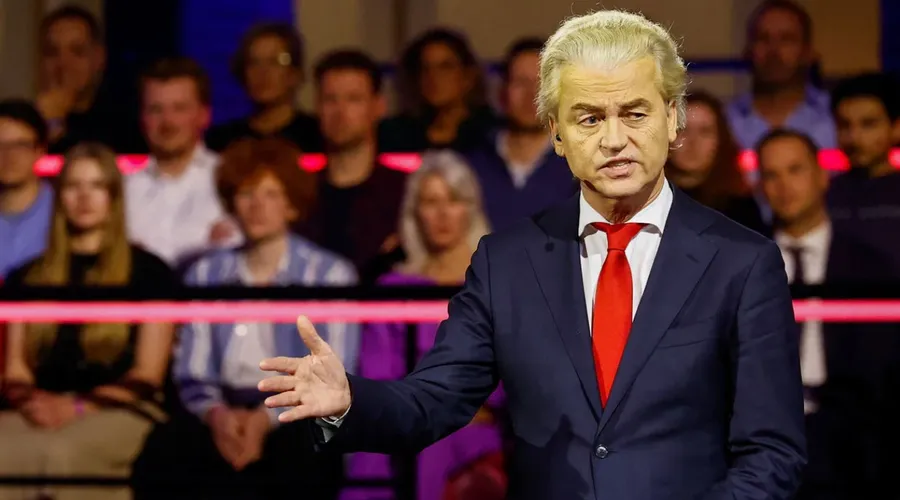
Populist Geert Wilders Loses Power, What can be Learned from his Defeat?
Geert Wilders, the Dutch populist leader, is once again banished to the political wilderness. This article outlines the political context and reasons for his most recent downfall and what can be learned in terms of political strategies as an opposition to combat populists when in office, in particular for US Democrats.
A Brief Overview of Dutch Democracy
The Netherlands has long been recognized as one of Europe’s most consensus-oriented democracies. Its electoral system plays a determining role in this. Members of the House of Representatives (Tweede Kamer-directly translates to 'second chamber' in English) are elected through proportional representation in a single national constituency, with seats allocated closely to each party’s vote share [1]. Because the threshold for entering parliament is extremely low, less than 1% of the national vote (for comparison, Germany’s threshold is 5%), Dutch politics naturally produces a highly pluralistic legislature, in which no party dominates [2].
Government, thus, emerges not from the victory of a single party but from coalition formation, where parties must collaborate across ideological lines. Coalition agreements are negotiated in extended talks following elections, with the Dutch monarch appointing mediators to identify viable combinations [3]. This process requires not only political vision, but patience, compromise, and a shared understanding that governance is fundamentally a collective pragmatic undertaking.
This system is often praised for protecting democratic inclusion. But it comes with a consequence: political actors who cannot compromise struggle to govern, even when they achieve strong electoral results. It is this structural logic that explains both the rise and the temporary setback of Geert Wilders.
The Political Identity of Geert Wilders
Geert Wilders has been a constant figure in Dutch politics since the mid-2000s. After leaving the People’s Party for Freedom and Democracy (VVD) in 2004 over disagreements about Turkey’s potential EU accession, he founded the Party for Freedom (PVV), a formation closely associated with his own identity and rhetoric [4].
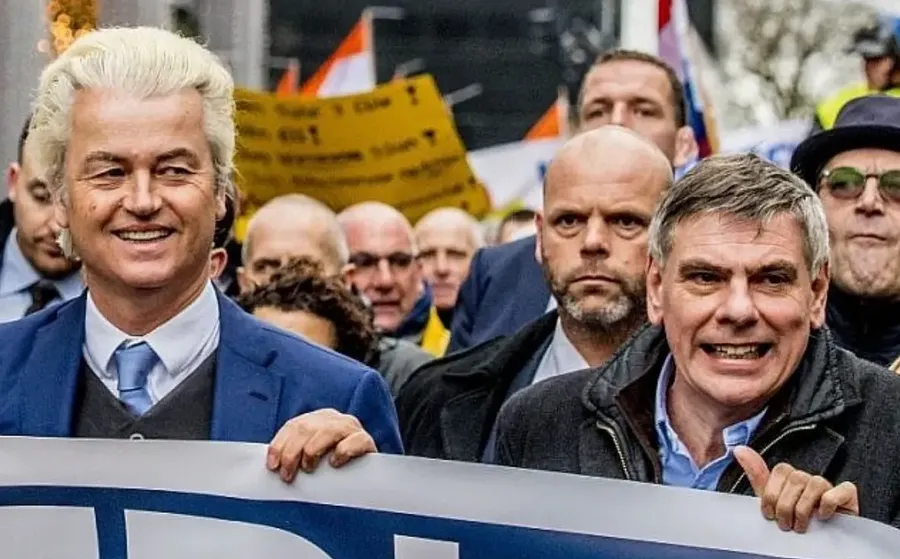
Dutch far-right politician Geert Wilders of the PVV party (L), and Belgium's Vlaams Belang Flemish right-wing party leader Filip De Winter lead a protest march against the policy of Dutch Prime Minister and his cabinet in Rotterdam, on January 20, 2018. (AFP PHOTO / ANP / Robin UTRECHT / Netherlands OUT)
Wilders’ political focus has remained consistent: he argues that Dutch cultural identity is threatened by migration and by Islam as a political and religious presence in Europe. Over the years, his proposals have included strict immigration controls, limitations on religious expressions of Islam, reductions in asylum quotas, and skepticism regarding European integration [5]. This positions Geert Wilders among Europe’s far-right cohort of illiberal ideologues.
Such positions have drawn both loyal support and fierce resistance. In 2016, Wilders was convicted (later partially overturned on appeal) for incitement after leading a rally that invoked discriminatory language toward Moroccan-Dutch citizens [6] with approximately 2.5% of the Dutch population having a Moroccan background [14]. Yet the persistence of his movement is evidence that his message resonates with a segment of the electorate that feels left behind by cultural change and global interdependence.
By 2023, however, Wilders began navigating the tension between ideology and institutional reality. To be considered a viable governing partner, he explicitly withdrew earlier proposals to ban mosques and the Qur’an, an acknowledgment that Dutch constitutional law places hard limits on majoritarian cultural legislation [7]. This move was not only tactical: it signalled an attempt to transition from perpetual opposition into government and at least superficially a willingness to compromise.
Why PVV Gained Momentum in 2023
Wilders’ 2023 electoral success, in which PVV became the largest single party, did not occur in a vacuum. It rested on structural and cultural developments that matured over several years.
One key factor was the salience of migration. The Dutch asylum reception system faced significant strain in 2022–23, with overcrowding in emergency facilities becoming a national news spectacle. While mainstream parties debated incremental reforms, PVV appeared decisive and consistent, having held the same positions for years [8]. This sentiment was further driven by a continued barrage of online rhetoric and memes, suggesting that Western democracy was under threat from Islam above all else.
A second factor was the rise of the Farmer–Citizen Movement (BBB), which transformed farmers’ protests over nitrogen emissions policy into a formidable electoral coalition in 2023. The movement utilized agricultural economics as a method to highlight their sense of threat to their cultural identity - a rural assertion against perceived urban, liberal, and technocratic dominance [9]. These protests were not just evident on the streets; in many small towns and villages across the Netherlands banners with slogans such as ‘farmer’s under threat’ were hung. Although BBB and PVV differed on economic and administrative questions, they shared a base defined by resentment toward an establishment perceived as distant and over-regulating.
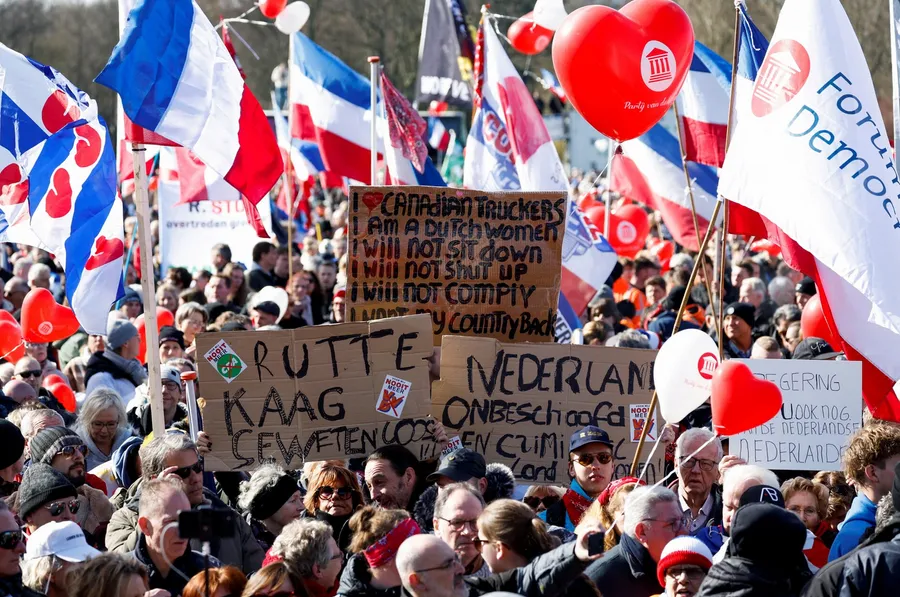
Dutch farmers holding banners and flags protest against government policies to limit nitrogen emissions in The Hague, Netherlands March 11, 2023. (REUTERS/Piroschka van de Wouw/File Photo)
Finally, after more than a decade of governance under Mark Rutte, a portion of the electorate simply desired rupture. PVV positioned itself as that break: not technocratic, not managerial, but emotionally direct.
By late 2023, these currents converged. PVV’s message landed at a moment when the electorate’s appetite for institutional continuity was unusually low.
The Attempt to Compromise and Govern
The challenge began after the victory. In the Dutch system, the largest party must assemble partners, and PVV’s ideological profile made this difficult. To make coalition talks possible, Wilders retracted some of his most constitutionally confrontational positions, but this moderation was selective and did not extend across the full policy platform [7].
Ultimately, a coalition was formed with the centrist and right-leaning People’s Party for Freedom and Democracy (VVD), the new conservative Christian reform party New Social Contract (NSC), and the Farmer-Citizen Movement. The coalition placed former security official Dick Schoof as a compromise prime minister which allowed the government to form without Wilders personally leading it [10].
This arrangement was politically fragile from the outset. It relied on balancing ideological purity and governance practicality, an equilibrium that Wilders had not been required to maintain in his role as outsider where a more moderate tone was untested.
The Collapse and the Reversal of Momentum
The coalition fell apart when PVV demanded sweeping and immediate changes to asylum policy that other coalition partners considered legally unworkable or institutionally destabilizing [11]. Rather than seeking incremental progress, Wilders reasserted maximalist positioning , the very posture that had made coalition governance difficult for 17 years.
The consequences were immediate and structural:
- The electorate was reminded that governing requires compromise.
- Parties across the spectrum publicly reaffirmed that they would not participate in a new coalition with PVV.
- Pro-European and centrist parties re-framed the election around competence, stability, and continuity.
The result was the resurgence of Democrats 66 (D66), who campaigned not primarily on opposition to Wilders, but on the need for coherent, workable governance grounded in Dutch constitutional norms [12]. When the next election was held, PVV lost ground, and D66 narrowly overtook it in vote share.
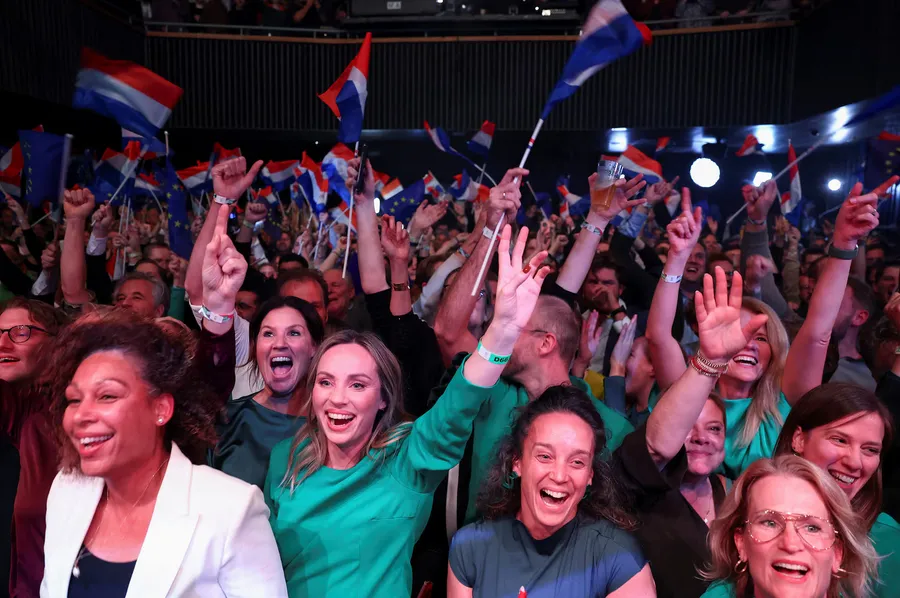
Democrats 66 (D66) supporters react to the first exit poll result in the Dutch parliamentary elections in Leiden, Netherlands, October 29, 2025. (REUTERS/Piroschka van de Wouw)
The decline was not dramatic, PVV remains a major force, but it was decisive enough to shift the initiative away from Wilders.
The Role of “Boer” Politics in Both Rise and Fall
It would be too simplistic to say that the fading of the farmer-driven protest wave caused Wilders electoral decline. Rather, the farmer movement changed the emotional climate, normalizing anti-establishment sentiment and making PVV’s rise possible.
But once the Farmer–Citizen Movement entered government, it faced the same constraint that PVV did: governance requires compromise, and compromise weakens the emotional force of protest [9].
Thus, the “boer wave” was a bridge, not the foundation. It made PVV viable, but PVV’s governing posture determined its durability.
Lessons Beyond the Netherlands: Lessons for the US Democrats?
Although American and Dutch political systems differ, one presidential and a binary choice, the other parliamentary and pluralistic, there is a strategic parallel worth noting. Research on populism shows that overt direct confrontation and moral condemnation often reinforce populist narratives of persecution, strengthening rather than weakening the movement [13]. The key is not to let them dictate the narrative but to highlight your own strong credentials and imply their weaknesses without directly stating them.
Dutch centrist parties did not attempt to out-shout Wilders or mirror his emotional register. Instead, they framed politics around governance capability and practical delivery, making the election a choice not between identities, but between functioning government and political theatre.
In the United States, this suggests that the most effective counter to populist radicalism may not be direct overt denunciation, but a credibly delivered politics of competence, grounded in visible improvement in material conditions.
In the Dutch case, the decisive factor was not simply that opposition parties refused to co-govern with PVV unconditionally; it was that this refusal was framed as the neutral application of constitutional norms rather than as political punishment. This is what political theorist J. Müller calls “non-demonstrative exclusion”, a form of boundary-setting that is not performed as moral condemnation, and therefore does not provide populists with the persecutory narrative they depend on [15]. Both optics and narrative are critical here. The strategy resembles what game theory literature identifies as conditional cooperation, an off-shoot of classic tit-for-tat: cooperation is offered when norms are respected, and quietly withheld when they are not, without attributing intent or hostility to the withholding itself [16]. In this framing, the failure of government is not a conflict between sides, but the self-disqualification of the party unable to participate in shared rules.
This has direct implications for the U.S. Because American politics is structured around two identity-anchored blocs, overt escalatory conflict tends to increase polarization rather than resolve it. Research shows that performative confrontation and moral denunciation reliably strengthen populist leaders, who then reinterpret institutional pushback as evidence of an enemy establishment [17]. But non-overt conditional reciprocity - in which cooperation is publicly offered on procedural and administrative terms, and quietly withdrawn only when the populist actor refuses to meet them - does not activate the same grievance mechanics. It shifts the narrative frame from “us versus them” to “capable versus incapable” governance.
In this environment, competence becomes the visible political differentiator. The lesson is not de-escalation, but narrative positioning: escalation must appear to arise from the far-right actor’s inability to govern, rather than from the opposition’s hostility. This is how democratic institutions defend themselves without reinforcing the populist story of victimhood.
The risk is to appear overtly non-cooperative, allowing the populists to use the combative rhetoric to their own advantage. The current US shutdown is directly resultant of the Democrats non-cooperation but the framing, narratives, and optics is critical here. Success of the Democrats current strategy will be measured in the polls as to who the US electorate consider responsible.
Whilst considering this potential lesson for US democrats, it is crucial to acknowledge that the institutional setting in which these strategies operate differs sharply between the Netherlands and the United States. The Dutch system, for all its fragmentation, retains (and retained) a strong culture of legalism, party discipline, and administrative continuity. The bureaucracy remains insulated from partisan intervention, electoral commissions are non-politicized, and constitutional norms enjoy broad multiparty support. Much of this is rooted in that Wilders’ power was contingent on a coalition, unlike in the case of D. Trump.
This means that conditional cooperation can be enforced by institutions themselves, rather than relying on individual political actors to uphold restraint. By contrast, in the United States, several of the traditional guardrails of democratic competition , such as judicial neutrality, voting rights protections, and nonpartisan civil service administration, have become sites of open contestation . This stark erosion alters the strategic environment: when institutional norms are already weakened, populist actors can more easily portray procedural enforcement as partisan aggression. In such a context, the success of non-overt conditional reciprocity depends not only on political framing, but also on the perceived legitimacy of the institutional referee.
Lastly, though the threat is diminished after electoral success, it never entirely fades. Geert Wilders will likely step out of the wilderness during the next Dutch election to sow division, hopefully this time not to reap its rewards.
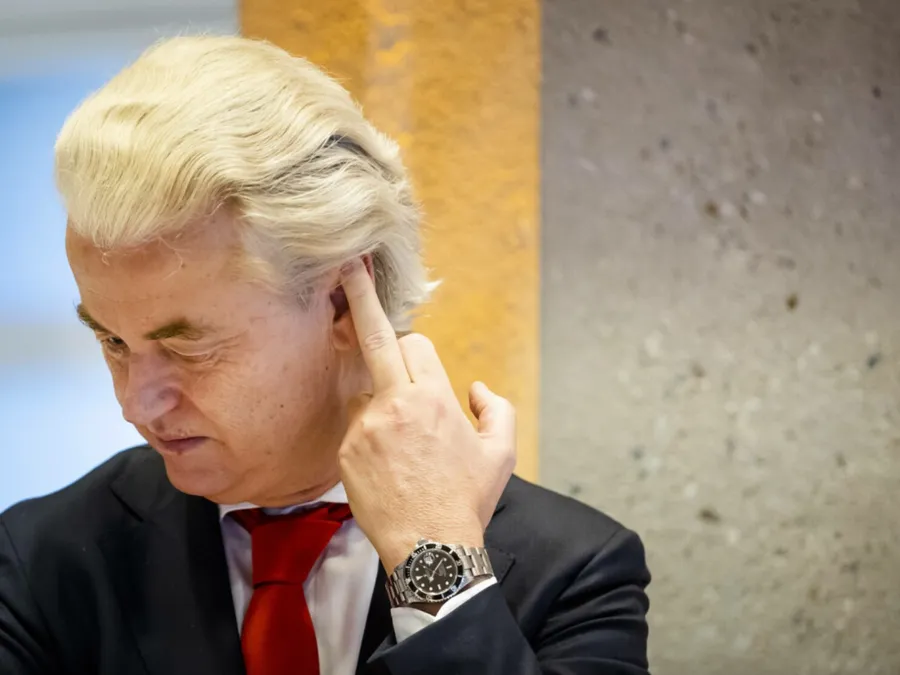
Bibliography
- Government of the Netherlands. Elections and the Voting System. Ministry of the Interior and Kingdom Relations.
- Otjes, Simon & Louwerse, Tom.“How Populists Wage Opposition: Parliamentary Opposition Behaviour and Populism in the Netherlands.” 2015
- Pellikaan, Huib, Keman, Hans, & van der Meer, Tom W.G. “The Dutch Party System.” Acta Politica 53(3), 2018
- Lucardie, Paul. “Right-Wing Populism in the Netherlands: Why the Failure?” Politics and Governance 2(1), 2014
- Rooduijn, Matthijs. “The Rise of the Populist Radical Right in Western Europe.” European View 18(1), 2019
- The Guardian “Geert Wilders Convicted of Inciting Discrimination.” December 9, 2016.
- Euronews. “Wilders Drops Mosque Ban to Enable Coalition Talks.” January 8, 2024.
- European Council on Refugees and Exiles / Asylum Information Database. Country Report: Netherlands. 2023 Update.
- Clingendael Institute. In Search of Control: Overcoming the Crisis Mode. The Hague: Clingendael, 2024.
- Reuters. “Former intelligence chief Dick School proposed as Dutch PM” 2024.
- The Guardian “Dutch government collapses as far-right leader pulls party out of coalition” 2025.
- DutchNews.nl. “D66’s Rob Jetten claims election win, aims for broad coalition” 2025.
- Mudde, Cas. “Populism: An Ideational Approach.” Government and Opposition 52(4), 2017
- Centraal Bureau voor de Statistiek (CBS). Bevolking; generatie, migratieachtergrond en herkomstgroepering. StatLine dataset, 2023.
- Müller, Jan-Werner. “Populists and The People.” London Review of Books, 2017
- Fehr, Ernst & Gächter, Simon. “Altruistic Punishment in Humans.” Nature
- Ostrom, Elinor. Governing the Commons: The Evolution of Institutions for Collective Action. Cambridge: Cambridge University Press, 1990
- Levitsky, Steven & Ziblatt, Daniel. “How Democracies Die”